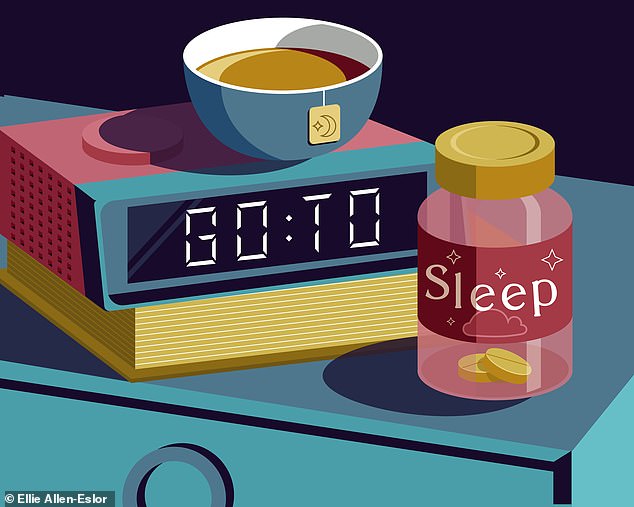My alarm clock went off at 7am. I couldn’t believe the time. The main thing I couldn’t believe, though, was the fact that I’d got any sleep at all. Only an hour earlier I’d been awake, resigning myself to yet another night with no rest.
Through the dark hours I’d paced the house in an anxious fug, as my husband and toddler slept. At 33 I now felt ill: dry-eyed, achey, nauseous. And I was about to go on a book tour where every evening I’d be talking to a roomful of people. I worried I wouldn’t be able to string a coherent sentence together, let alone speak with any eloquence.
Until I had my first baby in 2020, I had always been ‘good’ at sleep. Babies get a bad rap when it comes to slumber but my son was fairly kind to us – he went to bed at 7pm, woke up once a night at 3am and then was ready for the day at 7am. Instead, the trouble was that all my life I’d been told you needed eight good hours of sleep, ideally unbroken.
After I had my son, I wasn’t always getting that and began to worry. I started doing the time game: what if I didn’t go to sleep after the 3am feed? How many hours would I have had? How tired would I be the next day?

Best-selling author Lucy Foley
When you begin thinking like that, you start trying really hard to go back to sleep. And with sleep, the harder you try, the more elusive it proves.
Very quickly, my fears came true. Not only would I not fall back to sleep after that 3am feed but, some evenings, I’d become so anxious about getting sleep that I’d spend the whole night awake. I was desperate and strung out, terrified I wouldn’t be able to function or parent properly the next day. I’d worry about crashing the car while driving or, when I started working again after six months, being unable to write a coherent paragraph, let alone an entire book.
I’d lose my thread mid-sentence, forget words. I’d fall asleep at random times: in the car park while waiting to collect my son from nursery or at my desk. Once I missed my stop on the tube en route to an important meeting with my publisher when a ‘long blink’ turned into a full-blown nap.
Then, in the evening, I’d be so wired I couldn’t imagine ever wanting to sleep. It felt like the universe was playing a perverse trick on me.
This continued for weeks, months and, eventually, four years, on and off. It wasn’t that every night would be terrible. I’d have a few awful nights’ sleep, eventually crash out from total exhaustion, then be reminded that I did know how to sleep after all and this reassurance could see me through for a while. But then the next bout of baby cold or work stress or a sweaty summer heatwave night or jet lag would throw things out again.
It feels, oddly, terrifying to lie awake all night. I was simultaneously too exhausted and wired to do anything useful or pleasant, like write some of my book, read or even watch a film. I’d drift around the house like an over-caffeinated poltergeist. The nights would stretch interminably before me, dark and very, very lonely.
I’d resent my husband, a champion dozer who can drop off in less than a minute and would sleep through a brass band breaking into the bedroom to serenade him. I’d even resent my peacefully snoozing infant. But most of all I’d feel angry with myself: I had a young family I loved more than anything, a happy life, a dream job… there were people out there with real problems.

A few years back, in fact, I had had a real problem: a bout of chronic pain that lasted for several years. Now here I was with this strange, fabricated issue of my own invention, a kind of mental Chinese finger trap that my stupid brain had created all by itself.
As a society we’re obsessed with sleep. There are countless aids, supplements, and trackers available to buy. I know, because I’ve tried all of them: vitamins and minerals, ayurvedic tinctures, blackout masks, sleep patches, sleep pebbles, reflexology, acupuncture, white noise, meditation apps, aromatherapy, old-school antihistamine-based sleeping pills, bath salts, hypnotherapy, vagus nerve-stimulating gadgets, sleepy teas. You name it, I’ve winged-and-a-prayered it. Most of the time, they didn’t work. Or they worked for a bit and then stopped.
It isn’t that any of these interventions are bad or useless. But all our modern emphasis on the importance of ‘rest’ is contributing to the problem. I would, for instance, worry I might have forgotten some aspect of my nighttime ritual, in case ‘the spell’ didn’t work. Did I take the ashwagandha? The magnesium? Did I use the relaxing bath oil or accidentally dropper in the invigorating one? Did I sit too near the glow of the TV too close to bedtime? I became terrified of my bedroom. The bigger a deal I made of things, the more I forgot that I was an animal whose body simply knows how to sleep.
Therein, for me, lay the cure. Yes, the physical side effects of a chronic lack of sleep are uncomfortable, but we are programmed to be able to cope physically with a bad night’s sleep or even a run of sleeplessness. It’s how we react to it mentally that matters.
This realisation came about because nothing was working. It was a kind of laying down of arms: I was tired of trying so hard not to be tired. I wondered whether my insomnia wouldn’t be so bad if I just stopped stressing about it. It wasn’t an instant change in attitude. (I wasn’t convinced I could stop obsessing.) But over the next few weeks, my mindset began to shift – helped by a couple of incredibly helpful cognitive behavioural therapy (CBT)-based sources.
I won’t go into too much detail here because if you’re struggling, I reckon it’s much better that you consult the myriad resources available from people actually qualified in CBT, in particular the Re:sleep programme. In brief, though, I learned to wean myself off my weird and wonderful nighttime superstitions.
I began to use my sleepless time to do something comforting: watching old movies, listening to podcasts, reading books and, yes, sometimes even writing my own. No matter what time of night it was I would leave the bedroom and go to a comfortable armchair in my sitting room. Sometimes this would be for a couple of hours, sometimes only 20 minutes, before I felt sleepy enough to return.
I learned (and this was crucial for me) to wake up at the same time each day – 6.30am – no matter what time I’d gone to sleep. Initially this was rough and felt counter-productive. Wasn’t I trying to get more rest? Previously if I’d had a bad night, I’d at least let myself ‘catch up’ and lie in. But apparently this was only sending my circadian rhythm further out of whack. I also didn’t go to bed until I felt really, properly tired, however late that might be.
Quickly – after a mere few nights of this new routine – my confused body clock began to reset itself. I learned to get on with life: work, fun, exercise, food, all of it, regardless of what sort of night’s rest I’d had. Within a week I realised my sleep wasn’t as broken as I’d thought. After a month I wasn’t even thinking about sleep that much – it was just happening.
So this is the happy ending of the story.
Do I still experience the odd bad night’s sleep? Yes! Sometimes, several in a row. But do I suffer from bad sleep? No. Not in the same way as I once did. I have the odd flutter of worry about it – after everything it would be odd if I didn’t – but that pure, adrenaline-spiked, destructive fear that possessed me for four years has gone.
I found the magic spell, but it wasn’t in any potion or hypno tape or gadget: it was there inside me, all along.
The Midnight Feast by Lucy Foley is published in paperback by HarperCollins, £9.99. To order a copy for £8.99 until 27 July, go to mailshop.co.uk/books or call 020 3176 2937. Free UK P&P on orders over £25.










